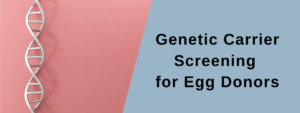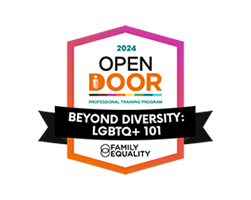Genetic carrier screening – or genetic testing – is performed by a blood or saliva test to determine if a person is a “carrier” for specific gene mutations that could result in a serious health condition being passed on to a child. Fertility clinics can vary in their recommendations and policies regarding carrier screening for egg donors. Some clinics will not require that an egg donor be screened, particularly if the intended father (or sperm source) has been tested and determined not to be a carrier of any genetic mutations that are cause for concern.
In this article, we’ll explore why genetic carrier screening for egg donors is important – and why we strongly encourage you, as the intended parent (IP), to advocate for genetic screening, even if your clinic does not require it. Joining us in this discussion is Karen Heller, a certified genetic counselor with 40 years of experience. Karen works with Egg Donor Solutions to conduct genetic counseling consultation sessions with our donors.
Below are four important considerations regarding carrier screening for egg donors.
1. X-Linked Conditions
X-linked conditions refer to gene mutations that are carried only on the X chromosome. Females have two X chromosomes while males have both an X and a Y chromosome.
“In carrier screening panels, about 15% of the genes are X-linked, meaning the risk comes through the egg provider,” Karen explains. “If a male inherits an X-linked condition, he will develop the disease because he only has one X chromosome. Females can be carriers for X-linked conditions without having any symptoms of the disease because they have a second, normal X chromosome that compensates for the genetic mutation. Since carrier screening for males usually does not include testing for X-linked conditions, it is important for egg donors to undergo carrier screening to rule out a risk for X-linked conditions in the child.”
Some of the more common X-linked conditions include:
Fragile X is the most common cause of inherited intellectual disability and autism. About 1 in 200 women is a carrier of Fragile X. While the disease can occur in both males and females, males are affected more frequently and with greater severity.
· Duchenne Muscular Dystrophy (DMD)
(DMD) is an X-linked form of muscular dystrophy, characterized by muscular degeneration and weakness. About 1 in 500 women is a carrier of DMD. The disease predominantly affects males, but in rare cases, girls can also develop symptoms.
“Boys with DMD begin to develop muscle weakness in early childhood and eventually lose the ability to walk and become confined to a wheelchair,” Karen says. “They typically die in their teens or early 20s; it’s a truly devastating disease.”
Fabry disease affects primarily males although female carriers can have mild symptoms. Problems generally begin in childhood and include kidney disease, pain in the hands and feet, stroke, and often death in early adulthood. About 1 in 500 women is a carrier for Fabry disease.
2. ASRM Guidelines & Expanded Carrier Testing
In its “Guidance regarding gamete and embryo donation” (page 9), the American Society of Reproductive Medicine (ASRM) provides specific guidelines regarding genetic counseling and screening for gamete donors. The ASRM states that all donors should be screened for certain diseases – including cystic fibrosis, spinal muscular atrophy and sickle cell – with expanded carrier screening recommended in some cases.
Since the ASRM’s guidelines were most recently updated in June 2021, expanded carrier screening, which includes more than 100 diseases, has been recommended by the American College of Medical Genetics and Genomics to be the standard practice.
“Based on this new guidance, expanded carrier screening is quickly becoming the norm, especially in the field of assisted reproduction,” Karen says. “It’s likely that expanded carrier screening for all donors will be added to the ASRM’s guidelines when the next iteration is published.”
Karen is quick to note that with expanded carrier screening, the likelihood that a donor will test positive for a genetic mutation is increased. However, it doesn’t mean that IPs cannot move forward with their chosen donor. Typically, additional testing will be required to compare the donor’s panel to the intended father’s genetic screening panel.
“Aside from the X-linked conditions, everything the donor is being screened for is recessive genes. It takes two recessive genes – one from the egg provider and one from the sperm provider – for there to be a risk of passing the condition on to a child,” Karen explains. “If the donor tests positive for a non-X-linked condition, then her panel should be compared to the intended father’s panel to see if they are both carriers for the same recessive gene. If the intended father is not a carrier for the same gene, then there’s no risk for that condition to impact the pregnancy.”
3. Access to Your Donor
The egg donation process, prior to the retrieval, is the only time IPs are guaranteed access to their donor for medical and genetic screening. It’s an opportunity to gather as much information about the donor as possible for your future child. While you can use the Donor Sibling Registry to communicate with your donor for updated medical information in the future, she will not be obligated to undergo any additional screening once the egg retrieval is complete.
“With egg donation, you are choosing someone to be a biological contributor to your child, and the donor’s genetics should be an important consideration,” Karen says. “The genetic conditions we have the ability to test for today can help IPs avoid potentially devastating diseases in their children. IPs can take advantage of the current technology of genetic carrier screening to learn about potential risks to their child. This can be valuable information to assist with selecting a ‘genetically compatible’ donor.”
4. Accurate Family Health History for Your Child
One of the biggest concerns for many donor-conceived people (those born through egg, sperm, or embryo donation) is not having access to accurate medical information or their complete family health history. In the 2020 “We are Donor Conceived Survey,” 96% of donor-conceived adults agreed with the statement, “It’s important for me to have a complete family history for myself,” and 72% agreed with the statement, “I worry I do not have a complete and/or accurate family health history.” By ensuring that your donor receives genetic carrier screening, you can help alleviate some of these concerns for your child in the future and also provide important health information about your child to his or her pediatrician.
About Karen Heller
A certified genetic counselor with 40 years of experience, Karen has partnered with Egg Donor Solutions for four years to provide genetic counseling consultation services for egg donors. Karen has a bachelor’s degree in mathematics and genetics and a master’s degree in human genetics and counseling.
If you have questions about genetic carrier screening for your donor, please reach out to your Care Coordinator at Egg Donor Solutions or send us an email at Info@CreateAHappyFamily.com.

We help Intended Parents Create Happy Families via Egg Donation & Surrogacy with the help of caring Egg Donors & Surrogates.
Donor sibling registry, egg donation process, Egg Donor Solutions, Intended Parents, Why use an agency?, Intended Parent Resources, Intended Parent Webinar, Getting started, Why our agency?, Selecting your donor.







